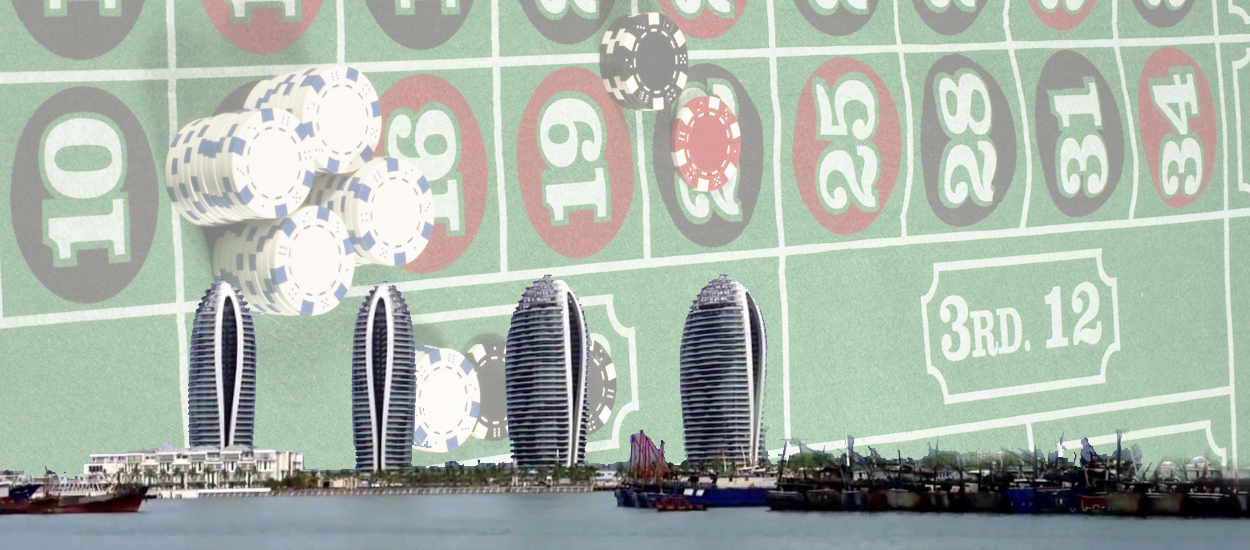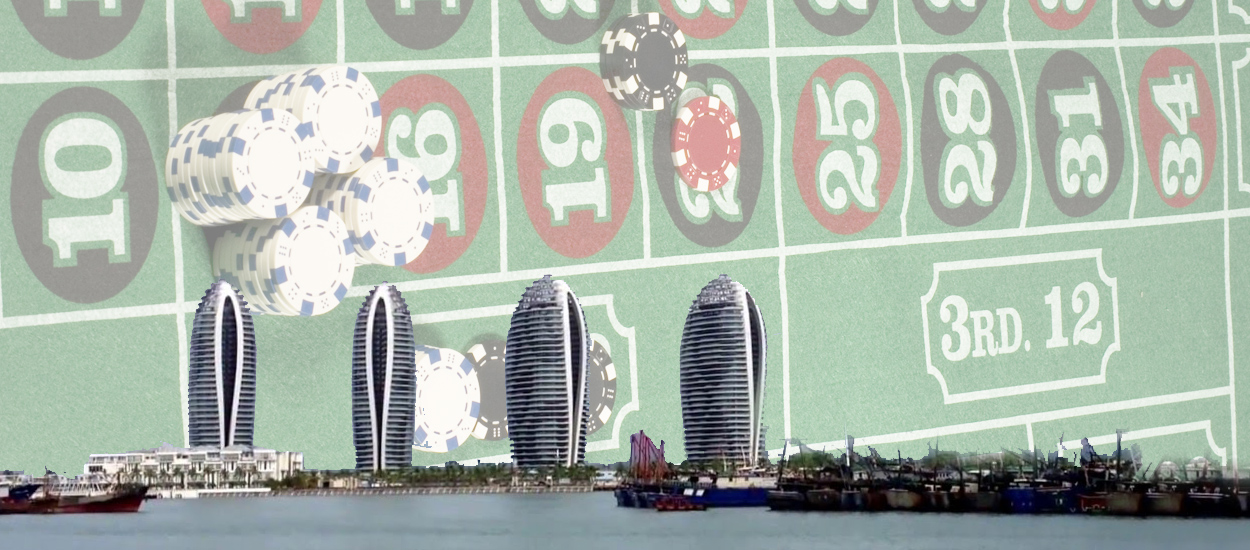China recently announced plans to build up its southern province of Hainan, which many have described as China’s Hawaii. At 13,600 square miles, the province is approximately the same size as Switzerland and consists of 200 different islands scattered across three archipelagos. Hainan’s biggest cities are Haiku and Sanya. Located on the South China Sea, Hainan’s climate is tropical for most of the year and subtropical in the winter. Temperatures rarely fall below 60 degrees Fahrenheit. The province (especially Sanya) is a large tourist destination and vacationers, along with wealthy Chinese residents, visit the province for its culture, cuisine, beaches and various events.
As a result of its potential and in a hope to strengthen China’s economy, the province has urged the Chinese government to attract more foreign investment to Hainan. So, in April of this year, Xi Jinping, the Communist Party President , who was recently appointed as leader for life after term limits were listed, announced a plan to gradually make the island a pilot free trade zone by 2020 and a full free trade port by 2025. The idea is to encourage foreign investment in various areas including agriculture, entertainment, sports, gambling and tourism, with a focus on medical tourism, i.e. hospitals and pharmaceuticals. Medical tourism has become popular but would be even more attractive as a free trade opportunity. The country said the advantages to medical professionals under the plan are fast-track approval for new drugs, technology and medical devices, extending up to three years the time foreign physicians are allowed to practice medicine, allowing 100% foreign direct investment and ownership in hospitals and a reduction of tariffs on certain medical devices and equipment.
And in the area of gambling, the country is encouraging companies to come forward and offer online gambling, lotteries and sports betting with a possible expansion to land-based casinos in the future. The advantages to gambling companies, of course, are easier access to the very lucrative Asian market, although it’s uncertain whether Chinese residents would be allowed to partake. Currently the law in China makes it illegal for Chinese residents to gamble, except in Macau and Hong Kong, and any person gambling or any company promoting gambling within any other part of China are subject to prison sentences. Macau was given an exemption since it was originally a Portuguese port and the economy was built around gambling, and Hong Kong was given an exemption because until a few years ago it was a British colony. In Hong Kong, the only legal gambling, however, is that offered by the Hong Kong Jockey Club. The Chinese government still has strong influence in Macau and Hong Kong and take a large percentage of the winnings, but in Hainan they would have full control. The law prohibiting gambling in mainland China can be changed easily under a communist government as there is no opposition party to try to hold the government to account.
 The decision to offer another gambling region in China has sent shock waves throughout Macau. The gambling the industry there is worth about $33 billion a year and it is almost certain that a second gambling destination in China would cannibalize the revenues from Macau. Plus, if the law is changed to permit Chinese citizens the ability to gamble online, it would really affect gambling revenues in Macau, since the area is known for corruption and no doubt vast numbers of citizens would forego visits to land-based casinos and would bet online instead. Currently Macau hosts many U.S. casinos such as MGM and The Sands, but its doubtful either would have interest in an online presence in Hainan. Sheldon Adelson, CEO of the Las Vegas Sands Corporation, has fought tooth and nail to get online gambling banned in the U.S. and it would be the height of hypocrisy to challenge U.S. online gambling laws but promote online gambling elsewhere in the world.
The decision to offer another gambling region in China has sent shock waves throughout Macau. The gambling the industry there is worth about $33 billion a year and it is almost certain that a second gambling destination in China would cannibalize the revenues from Macau. Plus, if the law is changed to permit Chinese citizens the ability to gamble online, it would really affect gambling revenues in Macau, since the area is known for corruption and no doubt vast numbers of citizens would forego visits to land-based casinos and would bet online instead. Currently Macau hosts many U.S. casinos such as MGM and The Sands, but its doubtful either would have interest in an online presence in Hainan. Sheldon Adelson, CEO of the Las Vegas Sands Corporation, has fought tooth and nail to get online gambling banned in the U.S. and it would be the height of hypocrisy to challenge U.S. online gambling laws but promote online gambling elsewhere in the world.
Similarities to Antigua
What is most interesting about the plans for Hainan is how eerily similar it is to what happened with the Caribbean nation of Antigua. To show the similarities we’ll start with the history of gambling in Antigua. Until 1981 Antigua was under British Rule, but the country gained its independence in that year and in 1982 it set up the International Business Corporations Act which encouraged foreign trade through reduced taxes and regulations. As a result, foreign companies set up shop in the areas of trade, shipping, manufacturing and most importantly banking and insurance. It was proving quite successful but it still didn’t generate enough revenue to support the economy and tourism was declining, so in 1994 Antigua decided to offer tax-free offshore gambling under an act passed by the Financial Services Regulatory Commission titled the Interactive Gaming and Wagering Act. There have been reports that Antigua asked the U.S. to help them promote tourism and the U.S. government suggested they should look at interactive gambling as a means to build the economy instead, but that has been disputed. It is more likely that some U.S. officials suggested they look at Internet options in the new economy and Antigua decided the best option in that regard was gambling. Antigua allowed any company to set up an interactive gambling operation in exchange for a $100,000 licensing fee. The fee was considered quite high, but most gambling companies deemed it worth the price considering the close access they would get to the U.S. market. In return the country offered tax-free online gambling and state of the art communications. The first online casino was started in Antigua in 1994 and the online gambling industry exploded in Antigua until the United States cut off banking options to the island in an effort to curtail Americans from gambling there, at which point the industry in Antigua plummeted. And as many know the reasons the U.S. took that action was to protect its own gambling industry at the behest of the large casino operators who believed offshore gambling was killing their profits.
Why online gambling will succeed in Hainan
Hainan was a part of other regions in China until 1988 when it gained its own independence as a separate province. It was designated as a Special Economic Zone, which was designed to attract foreign investment. There are currently three economic zones in the area – the Haikou Economic Zone, the New & Hi-Tech Industrial Development Zone and the Yangpu Economic Development Zone. The economic zones in China allow for special tax incentives for foreign companies, greater independence on international trade activities and reduced regulations. The products produced are generally export based and driven by market forces. But the key is that the trade is not free. China taxes the companies for the ability to operate in the zones. The new plan will make all trade and activities conducted in Hainan tax free, which as any analyst will tell you is an absolute must to attract online casino and sportsbook business.
While nothing is official and word from China is always speculative, one industry person I spoke to who has closely been following China’s plans said that officials there are planning to create a separate division of gambling in Hainan that will offer tax free online gambling and sports betting in exchange for a licensing fee. One expects that fee to be quite hefty, but given the access companies will have to the Asian market, it will likely be deemed worth the cost. The concern is the uproar it will likely cause to Macau companies along with anger by other Asian countries that do not allow their citizens to wager such as North Korea, Singapore and Malaysia. There is no doubt they will ask China to stop any gambling operators from offering gambling to their people but it is unlikely China will interfere. The main question is whether the gambling taking place in Hainan will be strictly to the non-Chinese market or whether it will cater to Chinese residents as well. In any case, one can expect companies like Bet365, William Hill, Ladbrokes and possibly Pokerstars to jump at the opportunity of gaining unfettered and supported access to the lucrative Asian market.
A different situation than Antigua
The biggest difference between Antigua and Hainan, is that Antigua is a small island with little power and they really had no chance of winning their battle against the United States when Uncle Sam told them to stop, and the WTO decision for Antigua proved to be meaningless. China, on the other hand, is the most populous country in the world and has the most power in the area, so if they demand other Asian countries must accept action from Hainan, it’s almost certain those countries will fall in line. Had the roles been reversed in 1994 and U.S. online casinos and sportsbooks offered their services to a reluctant Antigua, one can be sure that Antigua would have just given in and certainly a WTO decision for the U.S. demanding Antigua open their markets to American casinos would have been adhered to.
So, China seems prepared to move forward with new free trade port in the next seven years and online gambling firms are licking their lips. It’s quite ironic that a communist country that traditionally closed its markets to foreigners is now encouraging free trade, while the U.S. which is democratic and has always welcomed free trade is now the one putting up barriers.
To quote Bob Dylan, "The times, they are a changing."
Read insights from Hartley Henderson every week here at OSGA and check out Hartley's RUMOR MILL!








































